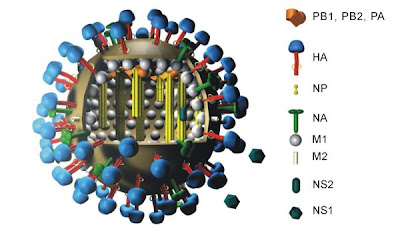Nowadays, H1N1 case is become serious. A lot of Malaysian people dead because of this disease. So, let see the following information about H1N1.
Under Electron Microscope

Q&A about H1N1 novel flu (“swine flu”)
What is H1N1 novel influenza (once called “swine flu”)?
H1N1 influenza is a respiratory disease caused by type A influenza viruses. It usually causes regular outbreaks in pigs and not in people. However, sometimes H1N1 viruses occur in people and, like seasonal flu, can spread from person to person. Cases of 2009 H1N1 novel flu were first reported in Mexico in February 2009. In the U.S., cases of human infection with H1N1 influenza A viruses were first reported in late March and early April in Texas and California, and have since spread to other states, including North Carolina. As with seasonal flu, illness may range from mild to severe, and some cases may be fatal.
What are the signs and symptoms of H1N1 novel flu in people?
The symptoms of H1N1 novel flu in people are similar to the symptoms of regular, seasonal human flu and include fever, cough, sore throat, body aches, headache, chills and fatigue. Some people have reported diarrhea and vomiting associated with H1N1 novel flu. Severe illness (pneumonia and respiratory failure) and deaths have been reported with H1N1 novel flu infection in some people. Like seasonal flu, H1N1 novel flu may cause a worsening of underlying chronic medical conditions.
How does H1N1 novel flu spread?
Spread of this H1N1 influenza A virus is thought to be happening in the same way that seasonal flu spreads. Flu viruses are spread mainly from person to person through coughing or sneezing of people with influenza. Sometimes people may become infected by touching something with flu viruses on it and then touching their mouth or nose. Infected people may be able to infect others beginning 1 day before symptoms develop and up to 7 or more days after becoming sick. That means that you may be able to pass on the flu to someone else before you know you are sick, as well as while you are sick.
Can I get H1N1 influenza from eating or preparing pork?
No. H1N1 influenza viruses are not spread by food. You cannot get H1N1 influenza from eating pork or pork products. Eating properly handled and cooked pork products is safe.
What should I do to keep from getting the flu?
First and most important: if you are ill and stay home from school or work to prevent spreading the virus to others. For your personal protection, wash your hands. Try not touch surfaces that may be contaminated with the flu virus. Avoid close contact with people who are sick. Try to stay in good general health. Get plenty of sleep, be physically active, manage your stress, drink plenty of fluids, and eat nutritious food. To avoid spreading flu to others, consult a doctor.
How long can an infected person spread H1N1 novel flu to others?
People with H1N1 influenza virus infection should be considered potentially contagious for at least 24 hours after fever is gone. (Fever should be gone without the use of a fever-reducing medication). Many people will continue shedding influenza virus 24 hours after their fever goes away, but at lower levels than during their fever. Children, especially younger children, might be contagious for longer periods.
What surfaces are most likely to be sources of contamination?
Droplets from a cough or sneeze of an infected person move through the air and can spread disease to people nearby. Germs can also be spread when a person touches respiratory droplets from another person on a surface like a desk and then touches their own eyes, mouth or nose before washing their hands.
How long can viruses live outside the body?
Some viruses and bacteria can live 2 hours or longer on surfaces like cafeteria tables, doorknobs, and desks. Frequent hand washing will help you reduce the chance of getting contamination from these common surfaces.
What can I do to protect myself from getting sick?
There is no vaccine available right now to protect against H1N1 novel flu. There are everyday actions that can help prevent the spread of germs that cause respiratory illnesses like influenza. Take these everyday steps to protect your health:
*If you get sick with influenza, stay home from work or school and limit contact with others to keep from infecting them.
*Wash your hands often with soap and water, especially after you cough or sneeze. Alcohol-based hand cleaners are also effective.
*Avoid touching your eyes, nose or mouth. Germs spread this way.
*Try to avoid close contact with sick people.
*Cover your nose and mouth with a tissue when you cough or sneeze. Throw the tissue in the trash after you use it.
What is the best way to keep from spreading the virus through coughing or sneezing?
If you are sick, limit your contact with other people as much as possible. Do not go to work or school if ill. Cover your mouth and nose with a tissue when coughing or sneezing. It may prevent those around you from getting sick. Put your used tissue in the waste basket. Cover your cough or sneeze if you do not have a tissue. Clean your hands every time you cough or sneeze.
What is the best way to wash my hands to avoid getting the flu?
Washing your hands often will help protect you from germs. Wash with your hands for 15 to 20 seconds with soap and warm water. When soap and water are not available, alcohol-based disposable hand wipes or gel sanitizers may be used. You can find them in most supermarkets and drugstores. If using gel, rub your hands until the gel is dry. The gel doesn't need water to work; the alcohol in it kills the germs on your hands.
What should I do if I get sick?
If you become ill with influenza-like symptoms, including fever, body aches, runny nose, sore throat, nausea, or vomiting or diarrhea, contact your health care provider. Your health care provider will determine whether influenza testing or treatment is needed.
If you are sick, you should stay home and avoid contact with other people as much as possible to keep from spreading your illness to others.
If you become ill and experience any of the following warning signs, seek emergency medical care.
In children emergency warning signs that need urgent medical attention include:
*Fast breathing or trouble breathing
*Bluish skin color
*Not drinking enough fluids
*Not waking up or not interacting
*Being so irritable that the child does not want to be held
*Flu-like symptoms improve but then return with fever and worse cough
*Fever with a rash
In adults, emergency warning signs that need urgent medical attention include:
*Difficulty breathing or shortness of breath
*Pain or pressure in the chest or abdomen
*Sudden dizziness
*Confusion
*Severe or persistent vomiting
♥our lips must always be sealed
 11:48 AM
11:48 AM

 Mc Donald Ice-Cream
Mc Donald Ice-Cream Music is my life
Music is my life Cinema: Watch -
Cinema: Watch -  Full-time Student Job
Full-time Student Job That Guy
That Guy Staight A SPM
Staight A SPM



 Tuesday, August 25, 2009
Tuesday, August 25, 2009
